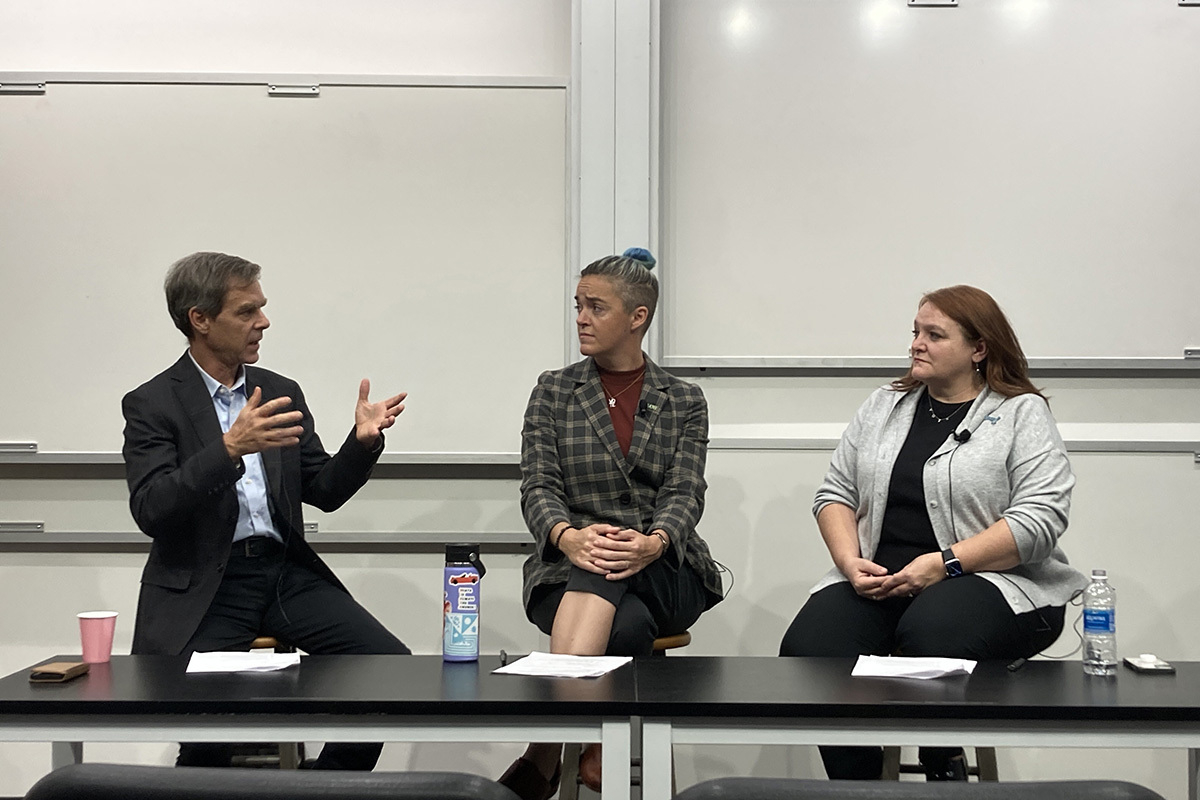
By Amanda Waldroupe ’07
October 10, 2024
Anxiety and controversy surrounding the results of the upcoming presidential election is nothing new in American history, two Andrew Carnegie Fellow scholars told a small audience of Reedies during a Tuesday afternoon panel discussion.
The Chicago Daily Tribune went to press before the results of the 1948 presidential election were fully in, leading to its infamous—and wrong—“Dewey Defeats Truman” headline. In 1876, Rutherford B. Hayes was accused of stealing the election. When running against one another, John Adams and Thomas Jefferson exchanged so many personal attacks that the press adopted a term now inextricable to presidential politics: mudslinging.
But what is new, and alarming, is that misinformation and skepticism now targets the fundamental nature of the American elections system, including attacking elections officials, poll workers, and people who count and tabulate ballots.
“That is fundamentally different,” Paul Gronke, professor of political science and founding director of the Elections & Voting Information Center, said.
Gronke moderated the panel, “From Bush v. Gore to the Big Lie: An Intellectual History of Election Administration, Election Law, and Election Denialism,” which featured Andrew Carnegie Fellows Dr. Lisa Bryant and Dr. Mara Suttmann-Lea.
Bryant, a professor and chair of the Department of Political Science at California State University, Fresno, focuses her research on election administration, voter confidence, and election reforms.
Suttmann-Lea, associate professor of American politics at Connecticut College, specializes in elections, voter participation and confidence in American democracy.
Topics ranged from the role of misinformation in fomenting voter skepticism, to the role of social media and cable television, to the 2000 presidential election, which Gronke called a “turning point in U.S. elections” in how voters view the integrity of elections.
The three panelists also recommended their favorite book on U.S. election administration and voting (see below).
Toward the end of the discussion, Gronke raised “the elephant in the room” when it comes to factors that have contributed to declining trust in elections—Donald Trump.
“See what I did there?” Gronke said, playing on the elephant being the symbol of the Republican Party. The comment elicited laughter from audience members.
“Trump style plays well to fuel beliefs in misinformation,” Bryant said. “He is the master of the sound bite.”
The responses of election officials are anything but a sound bite. America’s elections system is complex, in part because each state has a different system. Explaining a ballot’s chain of custody and other security precautions can’t fit in a TikTok video. “There are no catchy retorts,” Bryant said.
“The complexity makes it unriggable,” Suttmann-Lea said, but simultaneously creates an information vacuum among voters.
For America’s democratic-republic government and society to persist, Suttmann-Lea said “confidence in election administration is paramount.”
Recommended Reading
Ballot Battles: The History of Disputed Elections in the United States, Edward Foley
The Right to Vote: the Contested History of Democracy in the United States, by Alexander Keyssar
The Voting Wars: From Florida 2000 to the Next Election Meltdown, by Richard Hasen